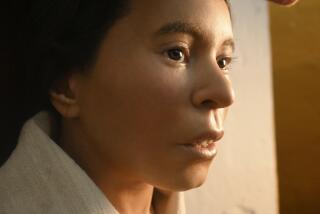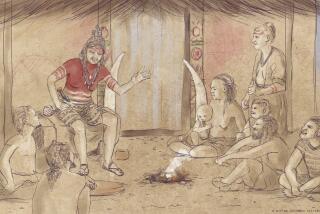Hair, nails and bones removed from Salvador Dali’s remains for paternity test
- Share via
Reporting from FIGUERES, Spain — Forensic experts in Spain have removed hair, nails and two long bones from Salvador Dali’s embalmed remains to find genetic samples for a paternity test — a move that opens the possibility for a woman who says she is the surrealist artist’s daughter to claim part of the Dali estate.
Officials said Friday that the artist’s mummified remains were so well conserved that even his famous mustache had survived the passing of time and remained in “its classic shape of 10 past 10,” referring to the positions of the hands on a clock.
Dali was buried in the Dali Museum Theater in the northeastern Spanish town of Figueres, his birthplace, when he died at 84 years old in 1989. The exhumation followed longstanding claims by Pilar Abel, a 61-year-old tarot card reader, who says her mother had an affair with Dali in the town.
In June, a Madrid judge ruled that a DNA test should be performed to find out whether her allegations were true.
Forensic experts opened the artist’s coffin Thursday night in a sensitive operation that involved using pulleys to lift a 1.5-ton stone slab.
Lluis Penuelas Reixach, the secretary-general of the Gala Dali Foundation, said Dali’s remains — including his mustache — are well conserved, mummified after the embalming process applied 27 years ago. He spoke to reporters Friday during a news conference in Figueres.
According to judicial authorities, only five people — a judge, three coroners and an assistant — were allowed to oversee the removal of the samples out of respect for the remains and in order to avoid any contamination.
Representatives of the foundation managing Dali’s estate said Friday the evidence backing Abel’s claims weren’t enough to justify the intrusive exhumation, and that it will continue a legal battle to nullify the paternity test.
Dali and his Russian wife, Gala — whose birth name was Elena Ivanovna Diakonova — had no children of their own, although Gala had a daughter from an earlier marriage to French poet Paul Eluard. .
Abel, who for a while made her living by reading tarot cards on local television, was born in Girona, a city close to Figueres. She has fought for the exhumation because she wants legal proof that the artist was her biological father after an alleged affair between her mother and Dali.
If proved right, she could claim one fourth of the painter’s estate, which is now in the hands of a public foundation, according to her lawyer Enrique Blanquez. There are no current estimates of the value of that fortune.
If she is proved wrong, the Dali foundation will seek financial compensation for the costs of the exhumation.
Either way, minimizing the disruption to the museum’s operations and to the rest of Dali’s remains is the priority for the foundation managing Dali’s estate, according to its secretary-general. “It’s important for Salvador Dali to be returned to rest in the interior of his museum’s dome,” Penuelas said.
The foundation and the museum took steps to make sure no images of the exhumation emerge in public. Before work in the crypt began on Thursday, mobile phones were put in a deposit and a marquee was installed under the museum’s glass dome to prevent any photography or video from drones.
The biological samples will travel to a forensic laboratory in Madrid for analysis, a process that could take weeks.
ALSO
Trump and Merkel’s relationship shows no thaw after G-20 summit
Trump returns from Paris to face growing legislative and legal problems. But first, golf
What led to beating death of 22-year-old U.S. tourist in Greece? Police search for answers
UPDATES:
5:35 a.m.: This article was updated throughout with additional details and background
This article was originally published at 1:40 a.m.
More to Read
Sign up for Essential California
The most important California stories and recommendations in your inbox every morning.
You may occasionally receive promotional content from the Los Angeles Times.










